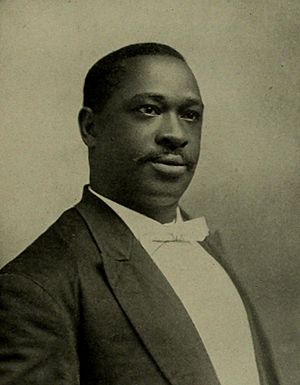Daniel Webster Davis facts for kids
Quick facts for kids
Daniel Webster Davis
|
|
|---|---|

Daniel Webster Davis circa 1902
|
|
| Born | March 25, 1862 Virginia |
| Died | October 25, 1913 Richmond |
Daniel Webster Davis (born March 25, 1862 – died October 25, 1913) was an important American teacher, minister, and poet. He worked in Richmond, Virginia, and became a well-known author and speaker. He traveled across the United States and Canada to give talks. He also published two books of poetry. People have different opinions about his poems. Some say he used old-fashioned ideas about African Americans. Others believe he was very brave for his time.
Contents
Daniel Webster Davis's Life Story
Daniel Webster Davis was born on March 25, 1862. His parents, Randall or John Davis and Charlotte Ann (Christian Davis), were enslaved. He was often called Webster. He moved to Richmond, Virginia, with his mother around the time of the American Civil War. His father had already passed away.
Early Life and Education
Webster went to public schools in Richmond. He graduated with honors from the Richmond High and Normal School when he was sixteen. After school, he worked different small jobs for a few years. He later said he had degrees from Guadalupe College. These degrees were likely honorary, meaning they were given to him as a special honor. He also helped start a literary club called the Garrison Lyceum.
Teaching Career
In 1879, Davis began teaching in Virginia. He taught at the Navy Hill School in Richmond. After four years, he moved to the Baker Street School. He continued teaching for over thirty years until he died. During some summers, he also taught and took classes to improve his teaching skills. He even taught summer school in West Virginia and the Carolinas. In 1887, he helped create the Virginia State Teachers' Reading Circle. This was the first group for African American teachers in Virginia.
Family and Ministry
On September 8, 1893, Davis married Elizabeth Eloise Smith. She was also a teacher at Baker Street. They had six children together, but only three lived to be adults. Around the time he got married, Davis started studying at the Lynchburg Baptist Seminary. He became a Baptist minister in 1895 or 1896. He was the pastor at the Second Baptist Church in South Richmond. He led this church from July 1896 until his death. During his time there, the church grew a lot, from 32 members to 500.
Public Speaking and Community Work
Davis became a very popular speaker. He gave talks all over Virginia, the United States, and even in Canada. In 1900, he spoke at a special event in Massachusetts. Two years later, he gave a series of lectures at the Hampton Summer Normal Institute. Besides his teaching and ministry, Davis was active in other ways in Richmond. He was a vice president for two companies. He also served on the board of Richmond's Society for Better Housing and Living.
Daniel Webster Davis's Writings
Davis was involved in publishing early in his career. He edited The Young Men's Friend, a publication for the YMCA. He also edited a weekly paper called Social Drifts. In 1895, he read a poem at a big event called the Atlanta Cotton States Exposition. He also wrote for magazines like The Voice of the Negro.
Poetry Books
Davis published two books of poetry. The first was Idle Moments, Containing Emancipation and Other Poems (1895). His second book was 'Weh Down Souf and Other Poems (1897). This second book included 21 poems from his first book and 21 new ones. Davis hoped his second book would be as popular as the work of Paul Laurence Dunbar.
Other Publications
In 1918, after his death, a book he wrote with Giles B. Jackson was published. It was called The Industrial History of the Negro Race of the United States. In 1910, he also published a biography about William Washington Browne.
Death and Lasting Impact
By 1910, Davis became ill. He went to Hot Springs, Arkansas, hoping to feel better. However, he passed away on October 25, 1913. He died from a kidney disease called chronic nephritis. Schools in Richmond that taught Black students closed for his funeral. The Richmond Planet newspaper called him "one of the most prominent and influential colored men the South had ever produced." Three schools in Virginia were named after him.
How People Viewed His Work
Daniel Webster Davis was very popular when he was alive. His work was published widely, especially in African-American newspapers and magazines.
Different Opinions on His Poetry
Davis's poems, especially his second book, have been seen in different ways. Some people have criticized his work. They felt it used old-fashioned ways of talking that might have supported harmful ideas about African Americans. A scholar named Jean Wagner wondered if Davis was truly expressing himself or just trying to be popular. Wagner described him as a poet who seemed to try to please the white majority. Another writer, Sterling Brown, compared him to a writer who focused on pleasing white audiences. His work has also been compared to that of Booker T. Washington, who often took a calm approach to race relations.
A Voice for Progress
However, other people have argued that Davis was a strong voice for his time. Some of his writings are seen as having a "mixed moderate-militant ideology." This means he was both calm and strong in his views. Some believe he was as proud of his race and as brave as a Black man in the South could be during that era. Some of Davis's poems suggested that white Americans would eventually have to answer for their actions against Black people. In his speeches, he also supported voting rights for Black people. He also spoke about the progress Black people were making in America.
 | Sharif Bey |
 | Hale Woodruff |
 | Richmond Barthé |
 | Purvis Young |

